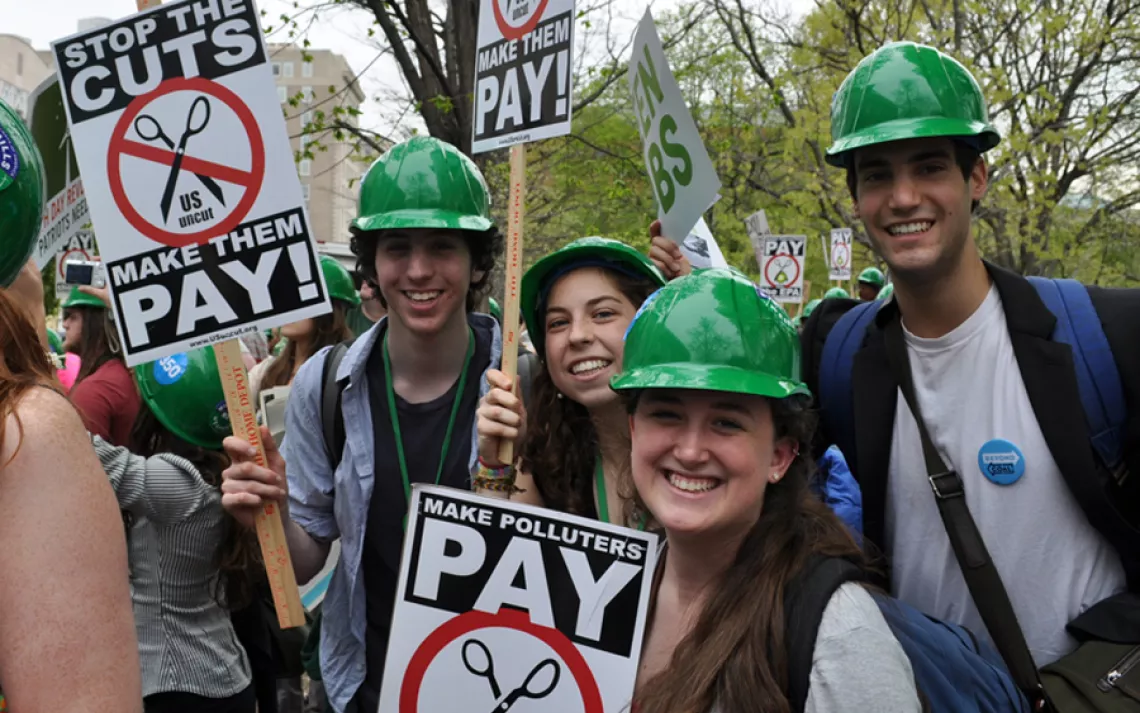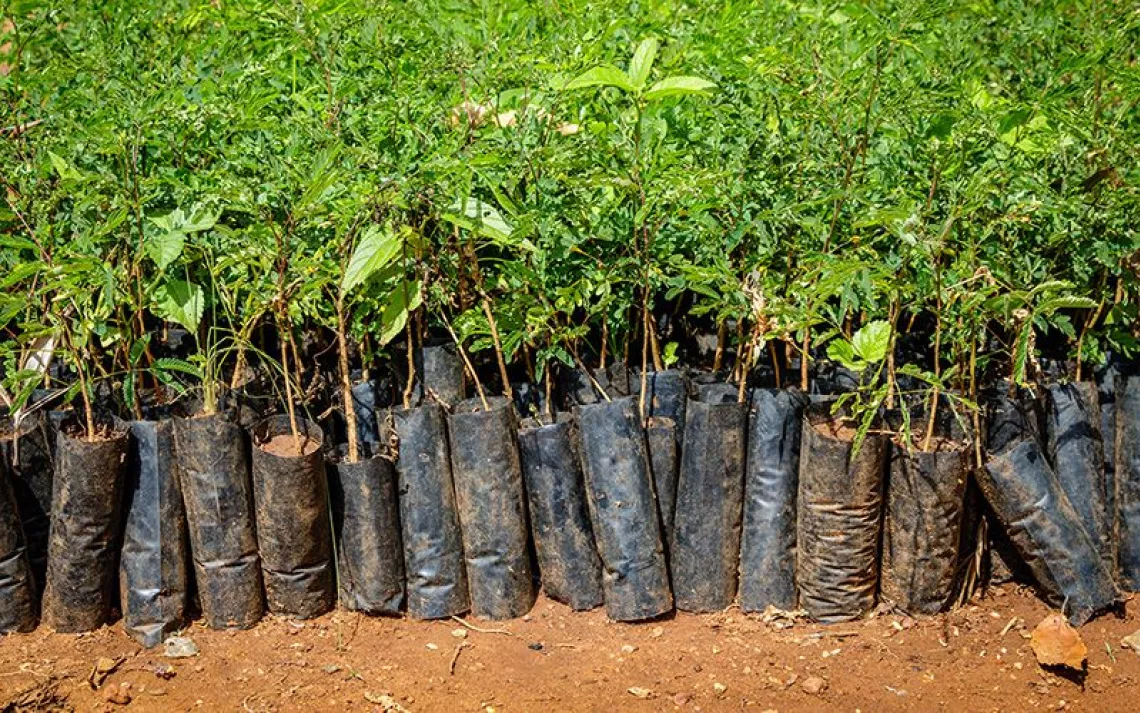Get to Know the Sierra Student Coalition
Tested pro tips for—and from—youth climate activists

Photos courtesy of the Sierra Student Coalition
Whether we’re talking about apartheid South Africa or the US South during the Jim Crow years, young people have historically led progressive social movements forward. Youths have certainly been critical in conveying the urgency of the climate crisis these past few years—calling for bolder solutions and activating millions to address climate change. Indeed, students and other young people have stopped dangerous fossil fuel infrastructure, called for a Green New Deal, and organized climate strikes and other mass actions that offer everyday people a platform and pathway to join the fight for climate justice.
This year marks the 30th anniversary of the Sierra Student Coalition (SSC). What started as a ragtag handful of youths who—activated by the Big Green Proposition in California (which ultimately failed)—planted themselves in the woods of Northern California during the summer of 1991 to sharpen their advocacy and activism skills, has grown into a large community of young activists from across the US and Puerto Rico. The Sierra Student Coalition has trained more than 3,000 young people in organizing skills, and climate and environmental justice issues, through our summer training program (Sprog). Sprog serves as a program for young organizers to deepen their skills and to build relationships with other youths in their regions—the idea is that this becomes the basis for effective organizing campaigns. We have also trained more than 400 young people through our Climate Justice Academy (CJA). Through CJA, young people who have an interest in climate and environmental justice but have little to no experience organizing can get their feet wet in the world of climate justice organizing and movement building.
 It’s no secret that the mainstream environmental and climate movement, including organizations like the Sierra Club, have historically been made up white, upper-middle class and often, older folks. The Sierra Student Coalition has had to grapple with this dynamic among our base as well, which is why in 2008 the SSC made a commitment to anti-oppression training at Sprog. This effort was largely led by the Black, Indigenous, and People of Color (BIPOC) and particularly BIPOC women of the SSC, who at the time were a minority of our base. But it’s not possible to build a just and sustainable youth movement with only those who have historically made up the mainstream environmental and climate movement. Through anti-oppression trainings, SSC-ers have been able to confront the ways in which white supremacy culture were showing up in the SSC and create a space where BIPOC, poor, and working-class people—and young people whose communities and identities are most impacted by climate change and interacting systems of oppression—could truly lead.
It’s no secret that the mainstream environmental and climate movement, including organizations like the Sierra Club, have historically been made up white, upper-middle class and often, older folks. The Sierra Student Coalition has had to grapple with this dynamic among our base as well, which is why in 2008 the SSC made a commitment to anti-oppression training at Sprog. This effort was largely led by the Black, Indigenous, and People of Color (BIPOC) and particularly BIPOC women of the SSC, who at the time were a minority of our base. But it’s not possible to build a just and sustainable youth movement with only those who have historically made up the mainstream environmental and climate movement. Through anti-oppression trainings, SSC-ers have been able to confront the ways in which white supremacy culture were showing up in the SSC and create a space where BIPOC, poor, and working-class people—and young people whose communities and identities are most impacted by climate change and interacting systems of oppression—could truly lead.
Because of this commitment, the SSC has become a space in which BIPOC, poor, and working-class youths, and youths with marginalized identities, lead and shape every aspect of our work. We accomplish this through discussions that deepen young peoples’ anti-oppression skills and analysis—through greater understanding of how solving climate change is not just about stopping the warming of our planet but also about Indigenous land rights and healing our relationship to the land. We talk about how climate action is also about ending the exploitation of communities for the profits of a few. By talking together, cooking together, challenging one another when we mess up, and trusting one another to do better, we’ve gone on to shape broader movements for justice.
As we look toward our next 30 years (and beyond), we stand affirmed to the commitment of building a just and sustainable future led by young people. The current systems, after all, are not working. Which is why the Sierra Student Coalition’s vision is to be a clearinghouse for youth strategy and impact. Learn more about the SSC's history via this video.

Make every day an Earth Day
Get articles like this one sent directly to your inbox.
With this action you affirm you want to receive Sierra Club communications and may vote on policy designated by the Sierra Club Board.
Feeling Inspired? Here are a few ways to get involved in the movement for climate justice as a student or young person:
-
 Gain the skills and resources to run effective campaigns for climate justice by attending an organizing training program like the Sprog) in the summer/fall and Climate Justice Academy in the spring.
Gain the skills and resources to run effective campaigns for climate justice by attending an organizing training program like the Sprog) in the summer/fall and Climate Justice Academy in the spring. -
Add your voice and vision to how young people can THRIVE by filling out the #YouthTHRIVE community survey and joining our #YouthTHRIVE campaign.
-
Get involved with a local student or youth-led climate justice organization or campaign. The Sierra Student Coalition is a member of the Power Shift Network, a network of youth-led climate organizations from around the US—see if there’s a member organization near you.
-
Can’t find an organization or initiative that speaks to you? Start your own! The SSC will be launching our Squad Chapter Program in October to support groups of young people who want to affiliate with the SSC and get access to training and resources for their campaigns. Stay up to date via our website here.
-
Follow us on social media (@sierrastudent) for updates and opportunities to take action, join movements, and become a part of big moments to advance our vision for climate justice.
-
Write a letter to the editor of your campus or city newspaper calling for citizen and governmental action toward climate justice and a transition toward clean energy.
-
Host a dorm or house party during which you and your guests share stories about what climate justice and clean energy in your community mean to you. Capture those stories in the forms of drawings, letters, or short videos, and share them on social media. (Pro tip: Tag your principal or college president!)
-
Ask your student government to pass a resolution in support of clean energy on campus.
-
Ask your principal or college president to commit to transitioning your school to 100 percent clean energy, and/or to divest from all fossil fuel holdings. You could make this ask in a meeting, by hand-delivering a letter, or by organizing a public community action (such as a protest or demonstration) on campus.
-
Ask your school district or college campus to transition the bus fleet to electric buses.
-
Organize friends, teachers, professors, and parents to move their money from big banks that fund fossil fuels (like Wells Fargo) to local credit unions (here's a handy credit union locator). Pro tip: Tell the bank why you are switching, and ask your campus leaders to join you as you move your money. (Be sure to tip off your local newspapers when you spark action like this!)
 The Magazine of The Sierra Club
The Magazine of The Sierra Club



